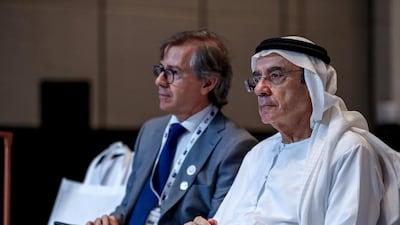About a quarter of a century ago, Francis Fukuyama famously predicted the end of history.
The end of the Cold War and the burgeoning of emerging economies gave way to a new optimism. The optimism didn't last long. Only a few years later, The End of History gave way to The Clash of Civilisations as described by the American political scientist Samuel P Huntington.
As most would agree, neither prophecy turned out to be quite true, or rather, both turned out to be somewhat true at various times but to a much lesser degree than expected by its authors.
If human history is characterised by such swings in the spirit of the time – from optimism to pessimism and back again – then it would seem that the global mood has lately turned towards pessimism.
A quarter century after walls came tumbling down in Europe, there is now talk of building new ones elsewhere.
Where free trade used to be an ideal for all nations to aspire to, we now hear strong voices advocating protectionism. And it would be hard to argue that voices of intolerance have not become stronger and even more accepted than they used to be.
What the world needs now, more than ever, is a sense of shared humanity. What the world needs is to connect human beings in mutual discovery, respect and appreciation of one another. What the world needs right now is cultural diplomacy.
I was honoured earlier this year when I was asked to establish an Office for Public and Cultural Diplomacy at the UAE’s Ministry of Foreign Affairs and International Co-operation. As we are a culturally vibrant country, my task is easy. My job is not to reinvent what we already have, but simply to use it to enhance our engagement with other cultures.
_______________
Read more:
UAE foreign minister: in the 15-minute news cycle, we can't afford to ignore criticism
Middle East states need to speak to their enemies, diplomat tells UAE forum
Nations must break up the diplomatic boys' club, UAE summit hears
_______________
But what can cultural diplomacy realistically achieve? I believe that cultural diplomacy is about connecting people. In a sense, connecting people is easier now than ever before. Social media provides a platform that links people around the world in unprecedented ways. It has never been easier for us to reach out, listen and learn from each other. And yet the same platforms can be used to spread distrust and division.
Cultural diplomacy is about insisting that cultural exchanges make us all stronger, not weaker. This is what Sheikh Zayed believed. He taught us to be open to others and to learn from them, and he reminded us of the common humanity that we share. It is in that spirit that the UAE has embarked on a new strategy for cultural diplomacy. At its core, the strategy is about building international understanding of the UAE's culture and values, in order to enhance the long-term potential for political, economic and security co-operation with other countries.
We do this through cultural exchange, whether in the arts, film, literature, architecture or music, but also more broadly in education, sports or other forums in which people can exchange ideas.
We do this on a small scale when we send our creative talent abroad for a festival. And we do it on a very large scale by hosting the Louvre in Abu Dhabi or by staging the Expo in Dubai in 2020. Of course, cultural diplomacy is not just about mutual enrichment and understanding. Cultural diplomacy is about innovation and creativity. The global trade in creative products continues to grow at a speed outpacing more traditional outputs in goods and services. I am proud to note that the UAE is at the forefront of this development.
The voices of extremism are always louder than those of moderation. It is therefore essential for us to give the world an understanding of our values and culture. The UAE itself is a modern experiment in diversity. More than 80 per cent of our population are foreigners. Each and every one of them has contributed to making our country stronger and richer.
We are proud of our heritage, but we are open to the world. We see our heritage strengthened by our engagement with the world, not weakened. It is precisely because we know who we are, and where we come from, that dialogue with other cultures does not threaten us. We know that it can only enrich us.
We are proud of our achievements in the UAE. We are proud to share our culture with the world.
And we welcome all of those who share their achievements and culture with us.


